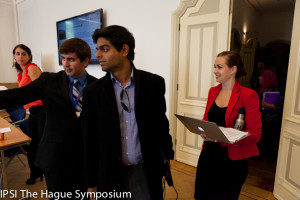by Kristy Dinsmoor, United States of America
 Wednesday – We are in the second day of a 3 day simulation and it has gotten real. A fictitious country is in the midst of a civil war and we have all been assigned roles of figures from that country and throughout the international community. There are many barriers, both real and artificial, due to hidden agendas within our assignments, language barriers, different interpretations, and personality clashes to name a few.
Wednesday – We are in the second day of a 3 day simulation and it has gotten real. A fictitious country is in the midst of a civil war and we have all been assigned roles of figures from that country and throughout the international community. There are many barriers, both real and artificial, due to hidden agendas within our assignments, language barriers, different interpretations, and personality clashes to name a few.
Though the simulation may be fictitious, the scenarios are taken from various real life events. These events are stressful and hit close to home, and yet there is also a sense that some just want to win the game. As we are able to reflect on the events thus far, it has raised a lot of questions and concerns about if the real world would really work this way. Surprisingly, the answer is that it doesn’t matter.
The biggest lessons we can take are not the procedures and reactions within a certain situation but rather the way we communicate, the way we handle pressure, how well we recognize the differences between irreconcilable differences and misunderstandings, and how creative our problem solving can be. These skills apply the same in both the fake and real world, in jobs and at home. And of course these concepts of being flexible and communicating well are both obvious and simple. But it’s easier said than done.
As much as one might expect that all professional receive the lessons and practice that we have, this is not always the case. And in fact, though many of us may wish to handle things differently upon reflection, it is clear that there are many people acting with more maturity and cooperation than we do see in the real world. Considering most of the participants have little to no experience with either the role they play or the culture and region for which we are operating in – many have taken more care and made better relationships than their real world counterparts. This brings hope that this class of future development and peace workers will contribute to a better future.
The human condition is imperfect especially in the heat of the moment. Practice makes perfect and indeed this year’s Hague Symposium simulation is a great place to do just that. If we can confront enough of our discomfort and hone our skills in places like this, we will all be much more effective development and peace workers in the real world.

